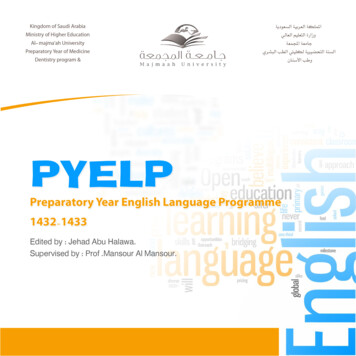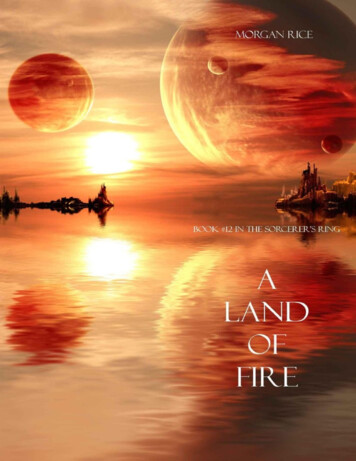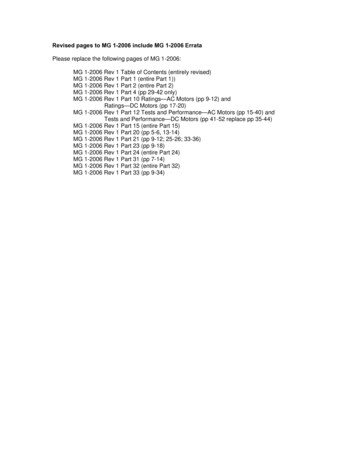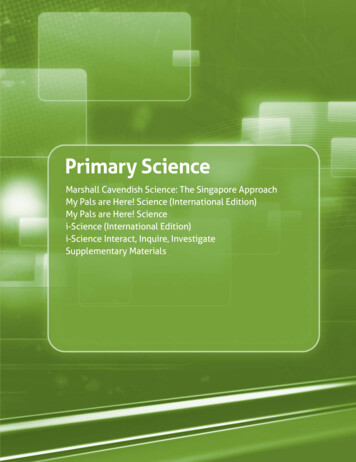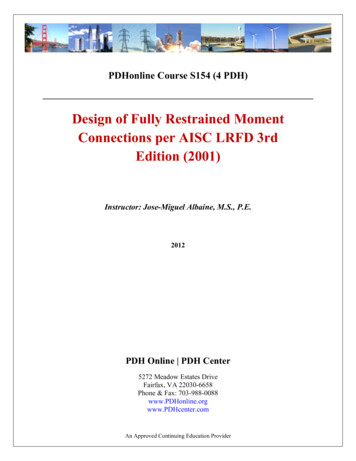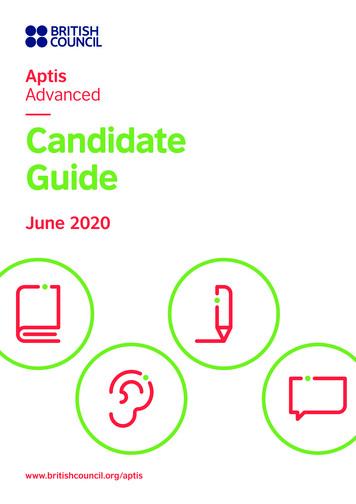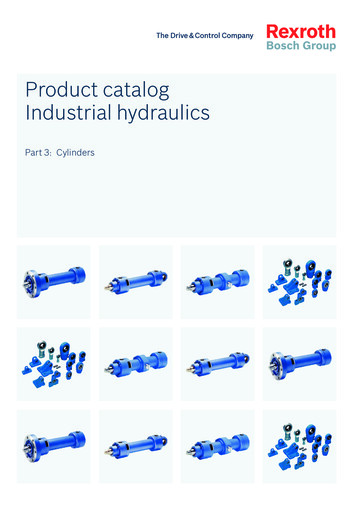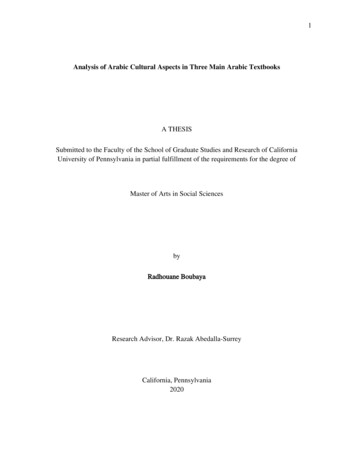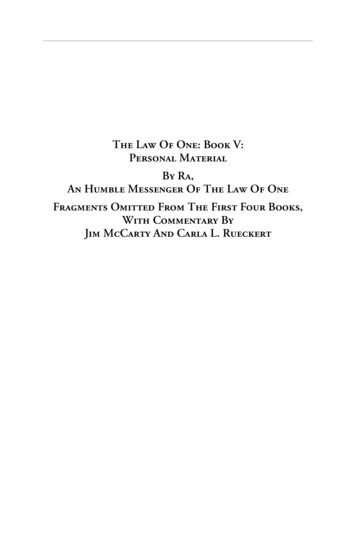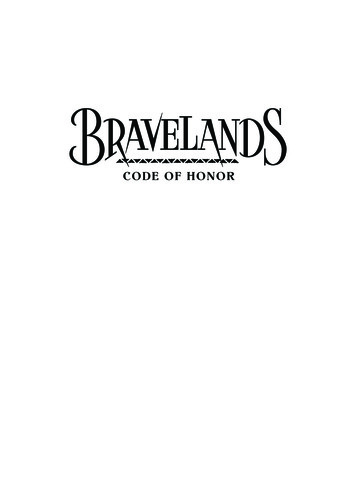
Transcription
BOOK I· PART A1r. Mencius went to see King Hui of Liang. 'You, Sir,' saidthe King, 'have come all this distance, thinking nothing of athousand li. 2 You must surely have some way of profiting mystate?''Your Majesty,' answered Mencius. 'What is the point ofmentioning the word "profit"? All that matters is that thereshould be benevolence and rightness. If Your Majesty says,"How can I profit my state?" and the Counsellors say, "Howcan I profit my family?" and the Gentlemen' and Commonerssay, "How can I profit my person?" then those above and thosebelow will be vying with each other for profit and the state willbe imperilled. When regicide is committed in a state of tenthousand chariots, it is certain to be by a vassal with a thousand chariots, and when it is committed in a state of a thousandchariots, it is certain to be by a vassal with a hundred chariots.A share of a thousand in ten thousand or a hundred in athousand is by no means insignificant, yet if profit is put beforerightness, there is no satisfaction short of total usurpation. Nobenevolent man ever abandons his parents, and no dutiful manever puts his prince last. Perhaps you will now endorse what II.2.3·King Hui of Liang: Names of persons and places are to be found in theGlossary.li: A-little over 400 metres.Gentlemen: In the present translation, 'Gentleman' is used to translateshih while 'gendeman' is used to translate chUn tzu. Shih was the lowestrank of officials While chan tzU denoted either a man of moral excellenceor a man in authority. The decision to use the same word for translatingboth these Chinese terms is not entirely arbitrary, as shih chiin tzu is aterm commonly used in the Mo tzu and the Hsiin tzu.
4ha"d "All.ve sar ,that matters is that thh uldand riahtness What . th. ere s obe benevolence"·Is e pomt 0 f mentromng· ·'profit'?"'the word50 Sun/ when wilt thou perish?We care not if we have to die with thee. 62. Mencius went to see King H . f L".m o lang The Kinstand mg over a pond. 'Are such thin. .g wasand wise man,, said h 1 kigs enjoyed even by a good.e, oo ng round at his wild geese anddeer.When the people were prepared "to die with" him, even if thetyrant had a terrace and pond, birds and beasts, could he haveenjoyed them all by himself?''Only if a man is aood and wi ,able to enjoy them "oth. hse, answered Mencius, 'is hethem.el"Wlse e would not, even if he hadHe surveyed and began the .Sacred Terrace3. King Hui of Liang said, 'I have done my best for my state.When crops failed in Ho Nei I moved the population to HoTung and the grain to Ho N e and reversed the action whencrops failed in Ho Tung. I have not noticed any of my neighbourstaking as much pains over his government. Yet how is it thepopulation of the neighbouring states has not decreased andHe surveyed it and measured it;mine has not increased?''The Odes say,.The people worked at it·In less than no time they' finish d .He e surveyed and began without haste·The p:ople came in eVer increasing nU:Ubers.The King was in the Sacred Park.The doe lay down;The doe were sleek·,The white birds glistened.The King was at the Sacred Pond.Oh! how full it was of leaping fish! It was with the labour of theI.p7op that King Wen builthis terrace and pond, yetso p ease and delighted werethey that they named his terrace the "Sa d This pond the "Sacred Pond"-a d . . cr . errace" andof deer, fish and turtles It , nb re[ I ed m his possession"th th. was y Suarmg their .WIe people that men of anti .enjoymentsselves.qmty were able to enjoy them'The T'ang shih says,4·BOOK I ·PART AHe surveyed . . leaping fish: Ode 242-'Your Majesty is fond of war,' said Mencius. 'May I use ananalogy from it? After weapons were crossed to the rolling ofdrums, some soldiers fled, abandoning their armour and trailingtheir weapons. One stopped after a hundred paces, another afterfifry paces. What would you think if the latter, as one who ranonly fifry paces, were to laugh at the former who ran a hundred?''He had no right to,' said the King. 'He did not quite run ahundred paces. That is all. But all the same, he ran.''If you can see that,' said Mencius, 'you will not expect yourown state to be more populous than the neighbouring states.'If you do not interfere with the busy seasons in the fields,then there will be more grain than the people can eat; if you donot allow nets with too fine a mesh to be used in large ponds,then there will be more fish and turtles than they can eat; ifhatchets and axes are permitted in the forests on the hills onlyin the proper seasons, then there will be more timber than theycan use. When the people have more grain, more fish and turtles5·6.SUn: The Sun stands for the tyrant Chieh whom the people did not darename openly. Cbieh was said to have remarked, 'My possesSion of theEmpire is like there being a sun in Heaven. Is there a time when the sunwill perish? If the sun perishes, then I shall perish (Han shih wai chuan,z./z.z.).0 Sun . die with thee: See the Shu ching (Shih san ching chu shu, x8I5edition), 8. 2b.·
8MENCIUSBOOK I · PART A9plough deeply and weed promptly, and if the able-bodied menlearn, m therr spare time, to be good sons and good youngerbrothers, loyal to therr pnnce and true to their word, so thatthey wrll 0 m the family, serve their fathers and elder brothers,and outsrde the farmly, serve their elders and superiors thenthey can be made to inflict defeat on the strong armo;r andsharp weapons of Ch'in and Ch'u, armed with nothing butclouds begin to gather in the sky and rain comes pouring down,then it will spring up again. This being the case, who can stopit? Now in the Empire amongst the shepherds of men there isnot one who is not fond of killing. If there is one who is not,then the people in the Empire will crane their necks to watchfor his coming. This being truly the case, the people will turn tohim like water flowing downwards with a tremendous force.staves.Who can stop it?"''These other princes take the people away from their workdurmg the busy seasons, making it impossible for them to tillthe land and so minister to the needs of their parents. Thusparents suffer cold and hunger while brothers, wives and children are separated and scattered. These princes push their peoplemto prts and mto water. If you should go and punish suchpnnces, who rs there to oppose you? Hence it is said, "Thebenevolent man has no match." I beg of you not to have anydoubts.'6. Mencius saw King Hsiang of Liang. Coming away, he said tosomeone, 'When I saw him at a distance he did not look like aruler of men and when I went close to him I did not see anythingthqt commanded respect. Abruptly he asked me "Through whatcan the Empire be settled?"''"Through unity," I said.'"Who can unite it?"'"One who is not fond of killing can unite it " I said.'"Who can give it to him?" 12''"No one in the Empire will refuse to give it to him. DoesYour Majesty not know about the young seedling? Should therebe a drought m the seventh or eighth month, 13 it will wilt. Ifr2. 'Who cangiv it to him?': For this idea of giving someone the Empire, cf.the senten ce m v. A. s, 6 'Who gave it to him'. Cf. further 'Hence it iseasr r to glV: the Emprre away than to find the right man for it' (III. A. 4 ),and Followmg the practice of the present day, unless there is a change inthe ways of t e people, a man could not hold the Empire for the durationof o e mormng, even if it were given him' (vi. B. 9). It is, however,possr?Ie that the text is corrupt. For a suggested emendation see D. c.Lau, Some Note on theMencius', Asia Major, Vol. xv (r 9 69 ).I3. the seventh or etghth month: This is according to the calendar of the7· King Hsiian of Ch'i asked, 'Can you tell me about the historyof Duke Huan of Ch'i and Duke Wen of Chin?''None of the followers of Confucius,' answered Mencius,'spoke of the history of Duke Huan and Duke Wen. It is for thisreason that no one in after ages passed on any accounts, and Ihave no knowledge of them. If you insist, perhaps I may bepermitted to tell you about becoming a ttue King.''How virtuous must a man be before he can become a trueKing?''He becomes a true King by tending the people. This is something no one can stop.''Can someone like myself tend the people?''Yes.''How do you know that I can?''I heard the following from Hu He:The King was sitting in the hall. He saw someone passing below,leading an ox. The King noticed this and said, 'Where is the oxgoing?' 'The blood of the ox is to be used for consecrating a newbell.' 'Spare it. I cannot bear to see it shrinking with fear, like aninnocent man going to the place of executibn.' 'In that case,should the ceremony be abandoned?' 'That is out of the question.Use a lamb instead.''I wonder if this is true?''It is.'Chou dynasty. The seventh and eighth months of the Chou calendar areequivalent to the fifth and sixth months of the calendar of today whichfollows that of the Hsia dynasty.
IOMENCIUS'The heart behind your action is sufficient to enable you tobecome a true King. The people all thought that you grudgedthe expense, but, for my part, I have no doubt that you weremoved by pity for the animal.''You are right,' said the King. 'How extraordinary that thereshould be such people! Ch'i may be a small state, but I am notquite so miserly as to grudge the use of an ox. It was simplybecause I could not bear to see it shrink with fear, like an innocentman going to the place of execution, that I used a lamb instead.''You must not be surprised that the people thought youmiserly. You used a small animal in place of a big one. Howwere they to know? If you were pained by the animal goinginnocently to its death, what was there to choose between an oxand a lamb?'The King laughed and said, 'What was really in my mind, Iwonder? It is not true that I grudged the expense, but I did usea lamb instead of the ox. I suppose it was only natural that thepeople should have thought me miserly.''There is no harm in this. It is the way of a benevolent man.You saw the ox but not the lamb. The attitude of a gentlemantowards animals is this: once having seen them alive, he cannotbear to see them die, and once having heard their cry, he caunot bear to eat their flesh. That is why the gentleman keeps hisdistance from the kitchen.'The King was pleased and said, The Odes say,The heart is someone else's,But it is I who have surmised it. 14This describes you perfectly. For though the deed was mine,when I looked into myself I failed to understand my own heart.You described it for me and your words struck a chord in me.What made you think that my heart accorded with the way ofa true King?'IIBOOK I · PART Ahundred chun 15 but not a feather; I have eyes that can see thetip of a new down but not a cartload of firewood," would youaccept the truth of such a statement?' No.''Why should it be different in your own case? Your bountyis sufficient to reach the animals, yet the benefits of yourgovernment fail to reach the people. That a feather is notlifted is because one fails to make the effort; that a cartloadof firewood is not seen is because one fails to use one's sight.Similarly, that the people have not been tended is becauseyou fail to practise kindness. Hence your failure to become a true King is due to a refusal to act, not to an inabilityto act.''What is the difference in form between refusal to act andinability to act?''If you say to someone, "I am unable to do it,'' when the taskis one of striding over, the North Sea with Mount T'ai underyour arm, then this is a genuine case of inability to act. But ifyou say, "I am unable to do it," when it is one of making anobeisance to your elders, then this is a case of refusal to act, notof inability. Hence your failure to become a true King is not thesame in kind as "striding over the North Sea with Mount T'aiunder your arm", but the same as "making an obeisance to yourelders".'Treat the aged of your own family in a manner befitting theirvenerable age and extend this treatment to the aged of otherfamilies; treat your own young in a manner befitting their tenderage and extend this to the young of other families, and you canroll the Empire on your palm.'The Odes say,He set an example for his consortAnd also for his brothers,And so ruled over the family and the state. 16'Should someone say to you, "I am strong enough to lift a14- The heart is . who have surmised it: Ode 198.r 5. chUn: Just unde! seven kilogrammes.r6. He set an example . and the state: Ode240.
I2MENCIUSIn other words, all you have to do is take this very heart hereand apply it to what is over there. Hence one who extends hisbounty can tend rbose within rbe Four Seas; one who does notcannot tend even his own family. There is just one thing inwhich the ancients greatly surpassed others, and that is the waythey extended what they did. Why is it then that your bounty issufficient to reach animals yet the benefits of your governmentfail to reach the people?'It is by weighing a thing that its weight can be known and bymeasuring it that its length can be ascertained. It is so with allthings, but particularly so with the heart. Your Majesty shouldmeasure his own heart.'Perhaps you find satisfaction only in starting a war, imperilling your subjects and incurring the enmity of other feudallords?''No. Why should I find satisfaction in such acts? I only wishto realize my supreme ambition.''May I be told what this is?'The King smiled, offering no reply.'Is it because your food is not good enough to gratify yourpalate, and your clothes not good enough to gratify yourbody? Or perhaps the sights and sounds are not good enoughto gratify your eyes and ears and your close servants not goodenough to serve you? Any of your various officials surely couldmake good rbese deficiencies. It cannot be because of rbesethings.''No. It is not because of rbese things.''In that case one can guess what your supreme ambition is.You wish to extend your territory, to enjoy the homage of Ch'inand Ch'u, to rule over the Central Kingdoms and to bringpeace to the barbarian tribes on rbe four borders. Seeking thefulfilment of such an ambition by such means as you employ islike looking for fish by climbing a tree.''Is it as bad as that?' asked the King.'It is likely to be worse. If you look for fish by climbing a tree,though you will not find it, there is no danger of this bringingdisasters in its train. But if you seek the fulfilment of an ambitionlike yours by such means as you employ, after putting all yourBOOK I · PART AI3heart and might into rbe pursuit, you are certain to reap disasterin the end.''Can I hear about this?''If the men of Tsou and rbe men of Ch'u were to go to war,who do you think would win?''The men of Ch'u.''That means that the small is no match for rbe big, rbe few nomatch for rbe many, and rbe weak no match for the strong.Within the Seas there are nine areas of ten thousand li square,and rbe territory of Ch'i makes up one of these. For one to tryto overcome the other eight is no different from Tsou going towar with Ch'u. Why not go back to fundamentals?'Now if you should practise benevolence in rbe governmentof your state, then all those in the Empire who seek office wouldwish to find a place at your court, all tillers of land to till theland in outlying parts of·your realm, all merchants to enjoy rberefuge of your market-place, all travellers to go by way of yourroads , and all those who hate" rbeir rulers to lay their complamts.before you. This being so, who can stop you ftom beconung atrue King?''I am dull-witted,' said the King, 'and cannot see my waybeyond this point. I hope you will help me towards my goal and.instruct me plainly. Though I am slow, I shall make an attemptto follow your advice.''Only a Gentleman can have a constant heart in spite of alack of constant means of support. The people, on rbe otherhand, will not have constant hearts if they are without constant means. Lacking constant hearts, they will go astray andfall into excesses, stopping at nothing. To punish them afterthey have fallen foul of rbe law is to set a trap for the people.How can a benevolent man in authority allow himself to set atrap for the people? Hence when determining what means ofsupport the people should have, a clear-sighted ruler ensuresthat these are sufficient, on rbe one hand, for the care of parents,and, on the other, for the support of wife and children, so thatthe people always have sufficient food in good years and escapestarvation in bad; only then does he drive them towards goodness; in this way the people find it easy to follow him.
MENCIUSinfluence over the whole Empire when he died at the age of ahundred. It was only after his work was carried on by King Wuand the Duke of Chou that that influence prevailed. Now youtalk as if becoming a true King were an easy matter. In that case,do you find King Wen an unworthy example?''How can I stand comparison with King Wen? From T'angto Wu Ting, there were six or seven wise or sage kings, and theEmpire was for long content to be ruled by the Yin. What hasgone on for long is difficult to change. Wu Ting commandedthe homage of the feudal lords and maintained the possessionof the Empire as easily as if rolling it on his palm.'Tchou was not far removed in time from Wu Ting. Therestill persisted traditions of ancient families and fine governmentmeasures handed down from earlier times. Furthermore, therewere the Viscount of Wei, Wei Chung, Prince Pi Kan, the Viscount of Chi and Chiao Ke, all nne men, who assisted Tchou.That is why it took him such a long time to lose the Empire.There was not one foot of land which was not his territory nora single man who was not his subject. On the other hand, KingWen was just rising from a territory of only one hundred lisquare. That is why it was so difficult.'The people of Ch'i have a saying,You may be clever,But it is better to make use of circumstances;You may have a hoe,But it is better to wait for the right season.The present is, however, an easy time.'Even at the height of their power, the Hsia, Yin and Chounever exceeded a thousand li square in territory, yet Ch'i hasthe requisite territory. The sound of cocks crowing and dogsbarking can be heard all the way to the four borders. Thus Ch'ihas the requisite population. For Ch'i no further extension ofits territory or increase of its population is necessary. The Kingof Ch'i can become a true King just by practising benevolentgovernment, and no one will be able to stop him.'Moreover, the appearance of a true King has never beenBOOK II PART Alonger overdue than today; and the people have ever sufferedmore under tyrannical government than today. It 1s eas to p o vide food for the hungry and drink for the thirsty. Confucms sa1d,The influence of virtue spreadsFaster than setting up posting stations for orders to betransmitted.'At the present time, if a state of ten thousand chario s wereto practise benevolent government, the people would reJo ce asif they had been released from hanging by th heels. Now 1s thetime when one can, with half the effort, achieve tw1ce as muchas the ancients.'. Kung-sun Ch'ou said, 'If you, Master, were given a position2above that of t he Chief Minister in Ch'i and were able therebyto put the Way into practice, it would be no surprise if throughthis you were able to equal the achievement of a leade of thefeudal lords or even a true King. If this happened, would 1t causeany stirring in your heart?'.'No,' said Mencius. 'My heart has not been snrred smce theage of forty.''In that case you far surpass Meng Pin.''That is not difficult. Kao Tzu succeeded in this at an evenearlier age than I.''Is there a way to bring such success about?''Yes, there is. The way Po-kung Yu cultivated his c ourage wasby never showing submission on . s fac or lettmg y neoutstare him. For him, to yield the ttmest btt was as hurmhatmgas being cuffed in the market place. He would no more acceptan insult from a prince with ten thousand chanots than from acommon fellow coarsely clad. He would as soon run a swordthrough the prince as through the common fellow. He had norespect for persons, and always returned whatever harsh tonescame his way.'Meng Shih-she said this about the cultivation of his courage."I look upon defeat as victory. One who advances onl r aftersizing up the enemy, and joins battle only after wetghing the
33SOOK II · PART AMENCIUSchanc es of victory is simply showing cowardice in face ofsupenor numbers. Of course I cannot be certain of victory. AllI can do 1s to be without fear."'Meng Shih-she resembled Tseng Tzu while Po-kung Yuresem bled Tzu-hsia. It is hard to say which of the two wassu enor, but Meng S hih-she had a firm grasp of the essential.Tseng Tzu once sa1d to Tzu-hsiang, "Do you admire courage?2I on e hea rd about supreme courage from the Master. If, onlookmg w1thm, one finds oneself to be in the wrong then eventhou?h one's ;dversary be o nly a common fellow c;arsely cladone s bound to tremble w1th fear. But if one finds oneself inthe nght, one goes forward even against men in the thousands."Meng Sh1h-she's firm hold on his ch'i3 is inferior to Tseng Tzu'sfirm grasp of essentials.''I wonder if you could tell me something about the heart thatca?not be nrred, m your case and in Kao Tzu's case?'Accordmg to Kao Tzu, "If you fail to understand wordsdoworry about this in your heart; and if you fail to under:s and m your heart, do not seek satisfaction in your ch'i.'' It isnght t?at one should not seek satisfaction in one's ch'i whenone fa1ls to understand it in one's heart. But it is wrong to saythat one should not worry about it in one's heart when one failsto understand words.'The will is commander over the ch 'i while the ch 'i is that which l s th body. Where the will arrives there the ch'i halts. Hence1t 1,s sa1d, "Take hold of your will and do not abuse your ch 'i."'you have already said that where the will arrives there thech t ha ts, what is the point of going on to say, "Take hold ofyour w1ll and do not abuse your ch'i"?''Th: will, when blocked, moves the ch'i. On the other hand,the ch t, when blocke lso oves the will. Now stumbling andhurrymg affect the ch t, yet m fact palpitations of the heart areno ,J:sproduced.' 52.3·4·5·the Master: I.e. Confucius.ch'i: For a di cussion of this term see Introduction, p. xxiv .No stumblmg and hurrying affect the ch'i: The ch'i here is the breathyet factof the heart are produced: This seems to be theof thts passage, wtth the rest of the section constituting a separate section.z palpita ionse d'May I ask what your strong points are?''I have an insight into words. I am good at cultivating my"flood-like ch 'i" .''May I ask what this "flood-like ch'i" is?''It is difficult to explain. This is a ch'i which is, in the highestdegree, vast and unyielding. Nourish it with integrity and placeno obstacle in its path and it will fill the space between Heavenand Earth. It is a ch'i which unites rightness and the Way.Deprive it of these and it will starve. It is born of accumulatedrightness and cannot be appropriated by anyone through asporadic show of rightness. Whenever one acts in a way thatfalls below the standard set in one's heart, it will starve. HenceI said Kao Tzu never understood rightness because he lookedupon it as external.6 You must work at it and never let it out ofyour mind.d At the same time, while you must never let it outof your mind, you must not forcibly help it grow either. You7must not be like the man from Sung. There was a man fromSung who pulled at his seedlings because he was worried abouttheir failure to grow. Having done so, he went on his way home,not realizing what he had done. "I am worn out today," said heto his family. "I have been helping the seedlings to grow.'' Hisson rushed out to take a look and there the seedlings were, allshrivelled up. There are few in the world who can resist the urgeto help their seedlings grow. There are some who leave the seedlings unattended, thinking that nothing they can do will be ofany use. They are the people who do not even bother to weed.There are others who help the seedlings grow. They are thepeople who pull at them. Not only do they fail to help them butthey do the seedlings positive harm.''What do you mean by "an insight into words"?''From biased words I can see wherein the speaker is blind;from immoderate words, wherein he is ensnared; from hereticalwords, wherein he has strayed from the right path; from evasivewords, wherein he is at his wits' end. What arises in the mindwill interfere with policy, and what shows itself in policy will6.7.Hence I said . . as external: Cf. V I. A. 4·the man from Sung: In the writings of the Warring States period the manhom Sung was a byword for stupidity.
3534MENCIUSinterfere with practice. Were a sage to rise again, he wouldsurely agree with what I have said.'8'Tsai Wo and Tzu-kung excelled in rhetoric; Jan Niu, MinTzu and Yen Hui excelled in the exposition of virtuous conduct. 9Confucius excelled in both and yet he said, "I am not versed inrhetoric.'' In that case you, Master, must already be a sage.''What an extraordinary thing for you to say of me! Tzu-kungonce asked Confucius, "Are you, Master, a sage?" Confuciusreplied, "I have not succeeded in becoming a sage. I simply nevertire of learning nor weary of teaching." Tzu-kung said, "Not totire of learning is wisdom; not to weary of teaching is benevol10ence. You must be a sage to be both wise and benevolent." Asage is something even Confucius did not claim to be. What anextraordinary thing for you to say that of me!''I have heard that Tzu-hsia, Tzu-yu and Tzu-chang eachhad one aspect of the Sage while Jan Niu, Min Tzu and YenHui were replicas of the Sage in miniature. Which would yourather be?''Let us leave this question for the moment.''How about Po Yi and Yi Yin?''They followed paths different from that of Confucius. Po Yiwas such that he would only serve the right prince and rule overthe right people, would take office when order prevailed andrelinquish it when there was disorder. Yi Yin was such that hewould serve any prince and rule over any people, would takeoffice whether order prevailed or not. Confucius was such thath would take office, or would remain in a state, would delay11his departure or hasten it, all according to circumstances. Allthree were sages of old. I have not been able to emulate any ofthem, but it is my hope and wish to follow the example ofConfucius.'What arises in the mind . what I have said: This passage is found alsoin III. B. 9·9·Tsai Wo and Tzu-kung . of virtuous conduct: Cf. the Analects ofConfucius, XI. 3·10. Tzu-kung once asked Confucius . both wise and benevolent: Cf. theAnalects, VII. 34· The version there seems less complete.u. Po Yi was such that . according to circumstances: Cf. v. B. 1.8.BOOK 11 · PART A'Were Po Yi and Yi Yin as much an equal of Confucius as that?''No. Ever since man came into this world, there has neverbeen another Confucius.''Was there anything in common to all of them?''Yes. Were they to become ruler over a hundred li square,they would have been capable of winning the homage of thefeudal lords and taking possession of the Empire; but had itbeen necessary to perpetrate one wrongful deed or to kill oneinnocent man in order to gain the Empire, none of them wouldhave consented to it. In this they were alike.''In what way were they different?''Tsai Wo, Tzu-kung and Yu Jo were intelligent enough toappreciate the Sage. 12 They would not have stooped so low asto show a bias in favour of the man they admued. Tsai Wo said,"In my view, the Master surpassed greatly Yao and Shun ."Tzu-kung said, "Through the rites of a state he could see itSgovernment; through its music, the moral quality of its ruler.Lookirlg back over a hundred generations he was able toappraise all the kings, and no one has ever been able to showhim to be wrong in a single instance. Ever since man came irltothis world, there has never been another like the Master." YuJo said, "It is true not only of me?. The unico n is the same. kind as other animals, the phoerux as other birds; Mount T aiis the same as small mounds of earth; the Yellow River and theSea are no different from water that runs in the gutter. The Sage,too, is the same in kind as other men.Though one of their kindHe stands far above the crowd.Ever since man came into this world, there has never been onegreater than Confucius.'''. Mencius said 'One who uses force while borrowirlg from3benevolence will' become leader of the feudal lords, 13 but to do12.13.the Sage: I.e. Confucius.One who uses . leader of the feudal lords: C . VII.A. 30.
MENCIUSlevy in lieu of corvi:e and the levy in lieu of the planting of themulberry, then all the people of the Empire will be ouly toopleased to come and settle in your state. If you can truly executethese five measures, the people of the neighbouring states willlook up to you as to their father and mother; and since mancame into this world no one ever succeeded in inciting childrenagainst their parents. In this way, there will be no match in theEmpire for you. He who has no match in the Empire is aHeaven-appointed officer, and it has never happened that sucha man failed to become a true King.'6. Mencius said, 'No man is devoid of a heart sensitive to thesuffering of others. Such a sensitive heart was possessed bythe Former Kings and this manifested itself in compassionate government. With such a sensitive heart behind compassionate government, it was as easy to rule the Empire as rollingit on your palm.'My reason for saying that no man is devoid of a heartsensitive to the suffering of others is this. Suppose a man were,all of a sudden, to see a young child on the verge of falling intoa well. He would certainly be moved to compassion, not because he wanted to get in the good graces of the parents, norbecause he wished to win the praise of his fellow villagers orfriends, nor yet because he
'profit'?"' " · Is e pomt 0 f mentromng · · the word 2. Mencius went to see King H . f L" stan d. mg over a pond. 'Are such thin m o . lang . The Kin g was and wise man,, said h 1 ki gs enjoyed even by a good deer. . e, oo ng round at his wild geese and
